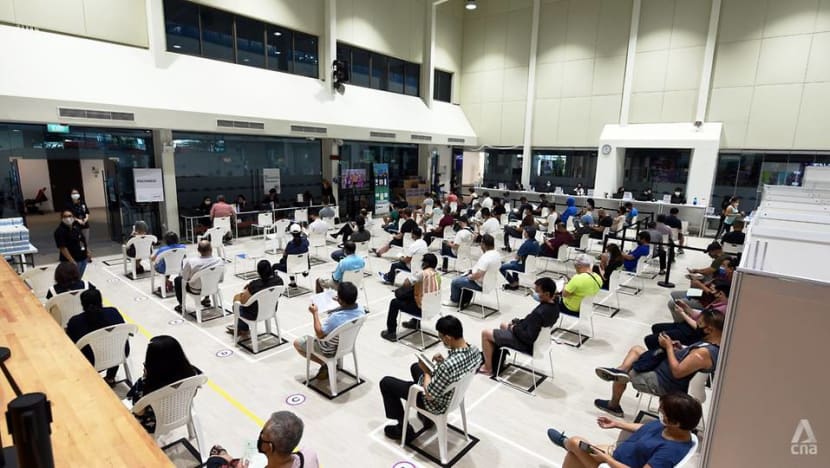Moderna COVID-19 booster gives 'significantly higher' antibody response among elderly with Pfizer-BioNTech vaccination: NCID study

SINGAPORE: Interim findings by the National Centre for Infectious Diseases (NCID) have shown that a Moderna COVID-19 booster shot will give older adults a "significantly higher" antibody response.
The findings were based on a clinical trial conducted on 100 participants who had received the Pfizer-BioNTech/Comirnaty shot as their primary series of COVID-19 vaccination. Half were aged under 60 years old, the other half above 60, with two eventually dropping out of the study.
Announcing its findings on Thursday (Mar 17), NCID said the stronger antibody responses for older adults included those against the "wild-type" SARS-CoV-2, and against all variants of concern, from Alpha to Omicron.
The study also found that for this group, on the seventh day after the booster shot, the average antibody level was roughly twice as high with Moderna than Pfizer-BioNTech/ Comirnaty and 1.5 times higher at Day 28.
"Neutralising antibody level against Omicron with Pfizer-BioNTech/ Comirnaty was 72.8 per cent at Day 28 versus 84.3 per cent with Moderna," added NCID.
However for younger adults, such a difference was not observed, with participants showing similar antibody levels whether they had received a Moderna or Pfizer-BioNTech/Comirnaty booster shot.
SIDE EFFECTS
Vaccine reactions were common among the participants, but these were "mild and short-lived", said NCID. Pain at the injection site within 72 hours of a booster shot, fatigue, followed by muscle pain were listed as common reactions.
For the participants aged 60 and older, fever and weakness occurred more frequently in those that received Moderna as a booster dose. No participant had a serious side effect, noted NCID.
On the overall findings, NCID said the observations complement studies from other international trials.
"(They) provide reassuring local data that a third dose of mRNA vaccine is safe and effective at boosting the immune response," said NCID.
Also driving home the significance of boosters was Dr Barnaby Young, who led the trial.
"Individuals at higher risk of severe COVID-19 such as older adults (60 years old and above) are more likely to have low antibody levels six months after primary vaccination series, so it is important that this group receives a booster shot," said Dr Young.
FURTHER STUDIES
Participants in the study, which began in October last year, will continue to be monitored for waning antibody levels. More blood samples collected after six months and one year.
Another study is currently taking place, said NCID. Up to 200 participants - who earlier received either the Pfizer-BioNTech/Comirnaty or Moderna vaccine as their primary series - will be randomly allocated to receive Pfizer-BioNTech/Comirnaty, Moderna or Covaxin booster shots.
Eventually, up to 600 participants may be enrolled in this series of studies, said NCID, adding that the participants will span a "good range of age and ethnicities, to reflect Singapore’s population".
BOOKMARK THIS: Our comprehensive coverage of the COVID-19 pandemic and its developments
Download our app or subscribe to our Telegram channel for the latest updates on the coronavirus pandemic: https://cna.asia/telegram














